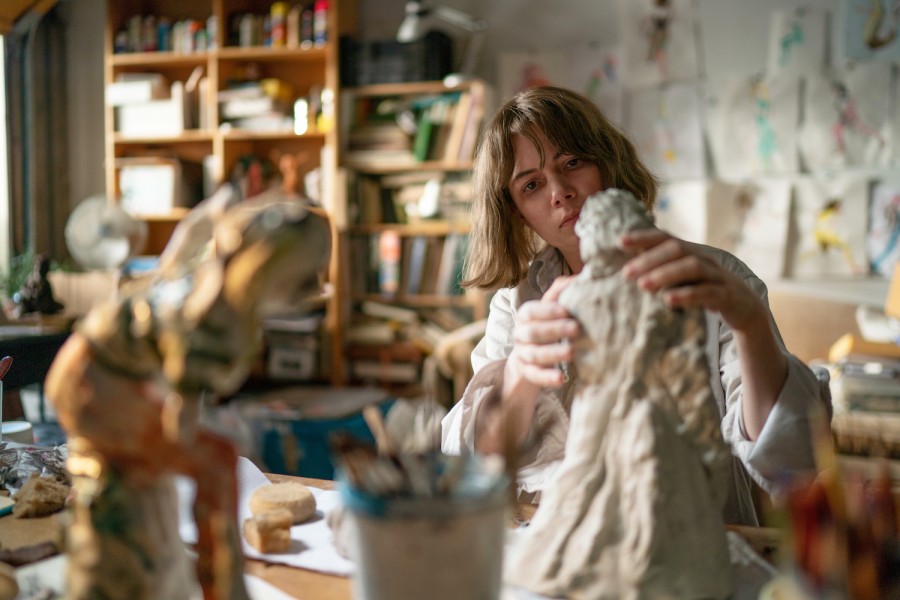Review: ‘Showing Up’ continues Kelly Reichardt’s soft-spoken hot streak
The Oregon-based director focuses on the studio art world in her latest film for A24. “Showing Up” is currently showing at select theaters in New York City.
Michelle Williams as Lizzy in the film “Showing Up.” (Photo by Allyson Riggs, courtesy of A24)
April 13, 2023
Kelly Reichardt may be the most consistent, empathetic director working in the United States today. Reichardt has regularly put together steady, simple films that reward patient viewers. From the tenderness of “First Cow” to the blissful triptych in “Certain Woman,” the director has a supernaturally good eye for distressed characters and vivid, natural settings. In “Showing Up,” released in theaters on April 7, Reichardt focuses on the studio art world of her native Portland, teaming up with Michelle Williams for the pair’s fourth collaboration. It’s a quietly marvelous film, one that takes the subtle tensions of Reichardt’s other work and applies them to a different, engaging milieu.
“Showing Up” rests on the shoulders of Williams (Lizzy), who plays a sculptor whose muted sighs and frowns exhibit a growing disquiet. Lizzy is somewhat stagnant, be it artistically, professionally or socially. She works at the Oregon College of Art and Craft as her mom’s assistant, creating posters for art exhibits she resents.
In her spare time, Lizzy works on her own art — she has a show coming up —and is often interrupted by her landlord and friend, Jo (Hong Chau). It’s within this Jo-Lizzy relationship that much of “Showing Up” develops. While Jo is confident and successful, Lizzy is subdued and unsure of herself. With skill, Reichardt and co-writer Jon Raymond display a new fault line in their relationship in nearly every interaction, starting with Jo refusing to fix Lizzy’s water heater. It’s Jo’s passive aggression that exacerbates the tensions throughout “Showing Up.”
We’re often shown Lizzy comparing herself, both consciously or unconsciously, to everyone around her, from her coworkers — who are all given more credibility as artists — to her brother, who’s called a “genius” by their mom. It soon becomes apparent that “Showing Up” is a calm, often enchanting depiction of the ease of focusing on what you don’t have.
It’s one thing to constantly see your friends, and your landlord, succeed when you feel like you can’t, but it’s far worse when you are working in a college where creativity is constantly buzzing around you. With Christopher Blauvelt’s handsome, fuzzy camerawork, each piece of art seems to contain a living temperament. For Lizzy, however, every new piece of art in the background adds another source of insecurity.
As with most Reichardt films, “Showing Up” features actors who bring a sense of world-weariness and honesty to their characters. Actors Judd Hirsch and Maryann Plunkett, along with rapper André 3000 and other supporting cast members, all appear for a handful of scenes, texturing the community that hovers in the film’s background. But what really makes “Showing Up” click is how unhurried Reichardt is in her directing, allowing the film to capture small ideas other directors wouldn’t think to capture.
One of the film’s most wonderful moments is a shot of skaters strolling by. At first glance, the shot appears superfluous, as the skaters are not directly related to Lizzy, Jo or anyone of note. However, this scene hits at the heart of “Showing Up” — the world is full of wasted opportunities rolling by, but the details of each moment are worth paying attention to.
Contact Ethan Beck at [email protected]

























































































































































